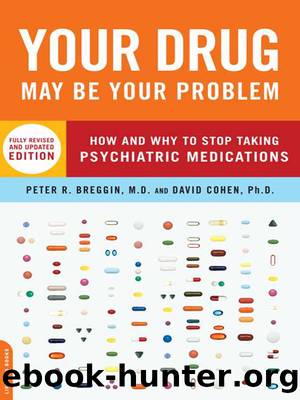Your Drug May Be Your Problem, Revised Edition by Breggin Peter; Cohen David;

Author:Breggin, Peter; Cohen, David; [PETER R. BREGGIN AND DAVID COHEN]
Language: eng
Format: epub
Publisher: Da Capo Press
Published: 2010-12-31T16:00:00+00:00
Understand What Influences the Ease of Withdrawal
The severity of your withdrawal reactions will depend on the type of drug youâre taking. For example, drugs with a shorter half-life (the amount of time it takes for the body to eliminate half of the drug) tend to produce more intense withdrawal symptoms, even during gradual withdrawal. Their withdrawal effects are also usually felt sooner after the last dose than those of drugs with longer half-lives. Information on the half-lives of drugs is almost always included in the drugsâ official labels published in the Physiciansâ Desk Reference.9
The intensity of your withdrawal will also depend on how long you have been taking the drug and how much you were taking on a daily basis. In general, itâs more difficult to withdraw from drugs taken at high doses and for several months or years.
The withdrawal process will also be influenced by your general state of health. Advancing age and chronic medical conditions, which render people more vulnerable to adverse drug effects, may also increase the difficulty of withdrawal. Sometimes, however, younger patients report more difficulties than older ones.
In addition, various subjective factors will undoubtedly play a role. Your attitude toward withdrawal is particularly significant. As we discuss below, the psychological fear of withdrawal, unless squarely faced, may represent a powerful obstacle. Your attitude toward physical discomfort is also important. For example, the urge to relieve even minor discomforts with pills may limit your willingness to put up with withdrawal-induced discomforts. Your knowledge of withdrawal reactions will also influence the way in which you deal with these reactions. Knowing in advance that you might experience a temporary withdrawal symptom will help to reassure you that the process is predictable. Finally, the support and encouragement you receive can be decisive. One study has shown that even a single encouraging letter from a doctor may help patients to significantly reduce their drug intake, even in cases involving drugs that have been taken for years and are widely considered addictive.10
Download
This site does not store any files on its server. We only index and link to content provided by other sites. Please contact the content providers to delete copyright contents if any and email us, we'll remove relevant links or contents immediately.
Spare by Prince Harry The Duke of Sussex(5173)
Machine Learning at Scale with H2O by Gregory Keys | David Whiting(4289)
Fairy Tale by Stephen King(3365)
Will by Will Smith(2904)
The Bullet Journal Method by Ryder Carroll(2555)
Hooked: A Dark, Contemporary Romance (Never After Series) by Emily McIntire(2540)
Rationality by Steven Pinker(2348)
It Starts With Us (It Ends with Us #2) by Colleen Hoover(2330)
Can't Hurt Me: Master Your Mind and Defy the Odds - Clean Edition by David Goggins(2319)
Friends, Lovers, and the Big Terrible Thing by Matthew Perry(2211)
The Becoming by Nora Roberts(2185)
Love on the Brain by Ali Hazelwood(2055)
The Strength In Our Scars by Bianca Sparacino(1834)
A Short History of War by Jeremy Black(1833)
HBR's 10 Must Reads 2022 by Harvard Business Review(1832)
Leviathan Falls (The Expanse Book 9) by James S. A. Corey(1724)
A Game of Thrones (The Illustrated Edition) by George R. R. Martin(1707)
515945210 by Unknown(1660)
Bewilderment by Richard Powers(1607)
